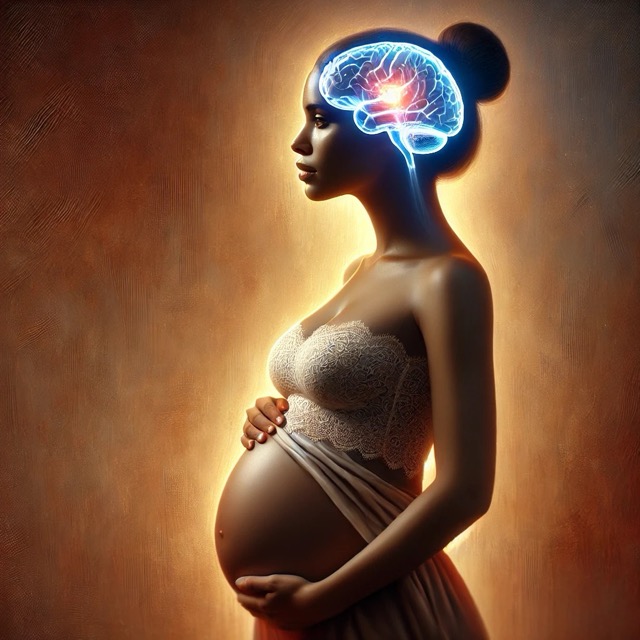A Brain Built for Motherhood: How Pregnancy Transforms the Maternal Mind

We all know that pregnancy changes a woman’s body in many ways, but did you know it also has a profound impact on the brain? A recent study published in Nature Neuroscience (2024) uncovers some remarkable changes in the brain during and after pregnancy, highlighting just how much the brain adapts to prepare for motherhood.
Led by a team of scientists, this study used advanced brain imaging technology to track changes in one woman’s brain, starting from before conception and continuing until two years after giving birth. The results? Significant reductions in gray matter (the part of the brain responsible for things like memory, decision-making, and social interaction) and an increase in white matter integrity (the connections that help different parts of the brain communicate). Let’s explore what these changes mean and why they matter.

How Hormones Trigger Brain Changes During Pregnancy
Pregnancy is a time of massive hormonal changes. Levels of hormones like estrogen and progesterone skyrocket to help support the baby’s growth. These hormones also affect the brain, reshaping it in ways we are just beginning to understand.
Past studies in animals have shown that pregnancy leads to new brain cell growth and other changes that prepare the brain for motherhood. This new study shows that something similar happens in humans. The researchers tracked the brain of a 38-year-old woman from three weeks before she became pregnant to two years after giving birth. They found that many parts of her brain shrank during pregnancy, particularly in areas related to social behavior and how we process emotions.
But this isn’t a bad thing. In fact, these changes may help women become better at understanding and responding to their baby’s needs. The brain seems to be getting rid of unnecessary connections and honing in on the skills required for caregiving.
Shrinking Gray Matter but Strengthening Connections
One of the key findings of this study was the decrease in gray matter volume, which started early in the pregnancy and continued through the third trimester. Gray matter is the part of the brain that helps with thinking, memory, and decision-making. About 80% of the brain regions studied showed reductions in gray matter volume during pregnancy, particularly in areas involved with social understanding, attention, and emotional regulation.
At the same time, the study found that white matter (the brain’s “communication highways”) actually became stronger. White matter helps different parts of the brain connect and work together, and this “boost” during pregnancy might be preparing mothers to process information from their babies more efficiently. For example, the brain areas that help mothers respond to their baby’s cries or detect subtle changes in their behavior may become more fine-tuned.
Brain Changes Persist After Birth
Interestingly, many of these brain changes don’t go away after the baby is born. The reductions in gray matter volume remained two years after childbirth, although some areas of the brain, like white matter connections, returned to normal.
What does this mean for new mothers? The brain seems to be undergoing a long-term transformation to help women adapt to motherhood. These changes may help with bonding, caregiving, and responding to the needs of a newborn. In a way, the brain is being “reprogrammed” to prioritize the baby.
The Role of Hormones in Brain Reshaping
The study found a strong connection between brain changes and the rise of pregnancy hormones, especially estrogen and progesterone. As these hormone levels increased, certain parts of the brain, like the hippocampus (which helps with memory and emotion), shrank in size. But this shrinkage may not be a loss—it could actually be a kind of “fine-tuning” of the brain, helping mothers focus on what matters most: caring for their baby.
For example, the parts of the brain responsible for thinking about others’ emotions (like the prefrontal cortex) and processing touch (like the somatosensory cortex) were especially affected. This could be why many new mothers report feeling more in tune with their baby’s needs.

Strengthening White Matter: Why It’s Important
While gray matter may shrink, the study also found that white matter (the fibers that connect different brain areas) gets stronger during pregnancy, especially during the second trimester. This might mean that the brain is improving its ability to send and receive information quickly—an important skill when you’re caring for a newborn who needs constant attention.
The specific white matter pathways that became stronger are involved in connecting the brain’s emotional and sensory centers. This could help new mothers become more responsive to their baby’s sounds, sights, and even smells, helping them react quickly to their child’s needs.
What Do These Brain Changes Mean for Mothers?
For mothers, these changes likely help with the transition to motherhood. The shrinking gray matter and strengthening white matter seem to reflect a brain that is becoming more efficient at focusing on caregiving. While the idea of brain shrinkage might sound alarming, it’s actually a natural and helpful process. The brain is getting rid of unneeded connections and strengthening the ones that help a mother bond with and care for her baby.
The study also suggests that pregnancy-related brain changes might be linked to mental health. Many women experience emotional shifts during and after pregnancy, such as increased sensitivity or a heightened focus on their baby. These brain changes could help explain why, and understanding them better might lead to new ways to support mothers, especially those dealing with postpartum anxiety or depression.
Why This Study Matters
This study is one of the most detailed looks we’ve ever had at how the brain changes during pregnancy. It highlights just how adaptive and dynamic the brain is, even in adulthood. While previous research has focused mostly on changes that happen after birth, this study shows that the brain is already changing well before the baby arrives.
The research also opens the door for future studies that could explore how these changes vary across different women. For example, do women who have high levels of pregnancy-related anxiety experience different brain changes? Could certain brain patterns predict how a woman will adjust to motherhood? These are just a few of the questions this study raises.
Final Thoughts: A Brain Built for Motherhood
This research provides fascinating new insights into the maternal brain and shows that pregnancy is a time of dramatic brain change. The brain doesn’t just support the baby’s development during pregnancy—it also transforms to help mothers meet the challenges of caring for their newborn.
For mothers, understanding these changes can offer reassurance that the emotional and cognitive shifts they experience are not only normal but part of a larger, beautiful process. Pregnancy molds the brain in ways that prepare women for one of life’s greatest transformations: motherhood.
As scientists continue to explore the intricacies of these changes, we can expect more discoveries that will help us understand the complex relationship between the brain and motherhood. And for new mothers, this research offers validation: your brain is changing for a reason, and it’s beautifully designed to help you navigate this incredible journey.
Read the full study on nature.com.





Responses